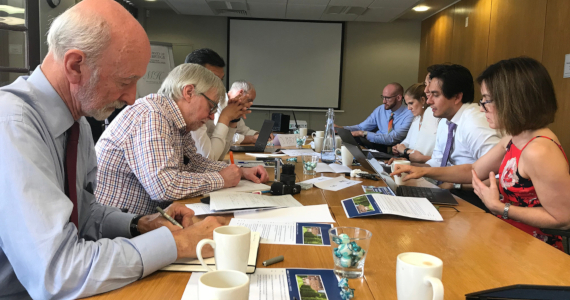IfM convenes leading international organisations on future manufacturing skills

Researchers and policy analysts from leading international organisations and from the Institute for Manufacturing came together on 24th June to share perspectives and research for understanding the future manufacturing workforce, in particular to identify opportunities to improve policy evidence-gathering, policy analysis and policy making.
The roundtable discussion at Madingley Hall in Cambridge was convened by the IfM’s Centre for Science, Technology and Innovation Policy (CSTI), together with the Policy Links Unit and the Babbage International Policy Forum. It brought together an invited group of representatives from the Organisation for Economic Co-operation and Development (OECD), United Nations Industrial Development Organisation (UNIDO), the World Economic Forum (WEF), and the United Nations Conference on Trade and Development (UNCTAD), as well as the UK government.
This year’s meeting focused on the topic of “Anticipating the future manufacturing workforce”, with discussion around the many challenges and opportunities for the future workforce driven by the changing nature of production. In particular, this group of researchers and analysts explored ways to better conceptualise future manufacturing systems and skills, and the implications for future workforce capabilities.
Themes addressed during the day included the implications for workforce policy development of:
- The evolving landscape for the future of manufacturing, and implications for the skills required across the workforce.
- The impact of automation on jobs, and how policymakers can approach reskilling and occupational transitions.
- The impact of new technologies on developing and developed countries, and issues around gaps in digital capability.
The roundtable has evolved into an annual event, following enthusiasm from attendees who identify the value gained from the opportunity to hear about initiatives and research from other international organisations. While much insightful work has been done by these organisations to build an understanding of the issues, there are few opportunities to bring this work together and facilitate open discussion among researchers and analysts to explore common threads.
CSTI’s Dr Eoin O’Sullivan said: “The IfM is ideally placed to build communities of interest among international policymakers, having worked with different organisations on separate initiatives and being able to identify contrasting and complementary experiences.”
Dr Jostein Hauge added “Discussion among participants from a range of perspectives enabled valuable questions to be opened up, and issues identified for further analysis and research.”
A report will be produced summarising the main points of discussion and emerging themes from the event, capturing effective practices and lessons learned related to how to analyse future workforce needs and translate findings into policy development.
Some of the key areas of discussion |
|
Policy analysis revealing the impact of technology within and between countries:
Understanding workforce restructuring and skills requirements
Anticipating the impact of automation on jobs
|









